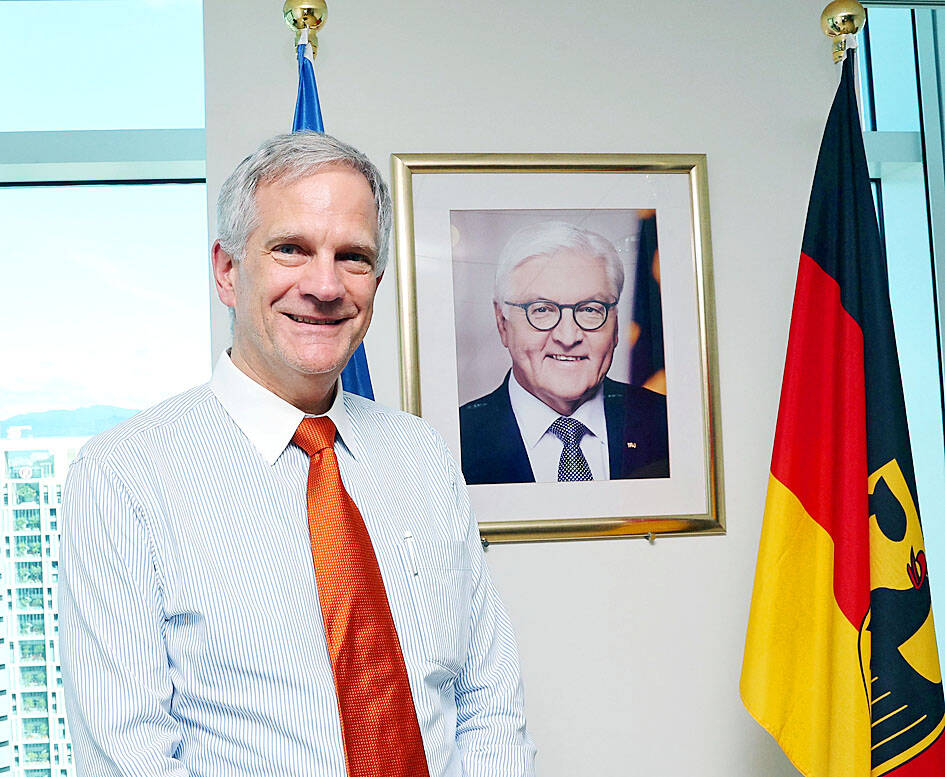Germany’s de facto embassy in Taiwan is expanding its diplomatic presence as Berlin seeks to deepen relations with Taipei, new German Representative to Taiwan Karsten Tietz said.
Tietz, who assumed office last month, said the German Institute Taipei — which represents Berlin’s interests in Taiwan in the absence of formal diplomatic ties — was undergoing a period of growth as Germany looks to bolster supply chain resilience and adapt to shifting geopolitical dynamics.
Germany now defines its relations with Taiwan in line with its China strategy, which emphasizes the need to derisk Berlin’s economic relations with Beijing and to diversify supply chains, Tietz said on Thursday.

Photo: CNA
“We’ll still be doing a lot of business with China, but not exclusively. So we are looking for other partners to diversify, and Taiwan is one of them,” he said.
Tietz described Taiwan as a key partner in efforts to bolster the resilience of supply chains for semiconductors and other critical industries, citing shared values of freedom and democracy, as well as respect for the rules-based international order.
Bilateral collaboration is not confined to semiconductors, which have gained momentum with the foundry Taiwan Semiconductor Manufacturing Co is building in Dresden, Germany, he said, adding that the two sides recently signed agreements to deepen cooperation in microelectronics, artificial intelligence and hydrogen.
Given Taiwan’s growing importance to Berlin, the German Institute Taipei would add four new people by January next year, bringing the total to 25, including local hires, Tietz said.
In particular, the number of people handling political, economic and cultural affairs would double from two to four, he said, describing this expansion as “a clear signal that we place high importance on our relations [with Taiwan] and want to be more visible.”
Germany has also stepped up its regional presence, with two German military vessels transiting the Taiwan Strait in September last year for the first time in 22 years.
Other G7 nations — including the US, the UK, Canada and France — have over the past few years sent military vessels through the Strait to assert the principle of freedom of navigation.
Tietz said that during his time as Hong Kong deputy consul general from 2015 to 2018, he witnessed the erosion of civil liberties following the failure of the “Umbrella movement,” adding that it “left a lasting impact” on him.
“I basically saw how a free society turned into one where people don’t dare to exercise freedoms,” he said. “I have a deep understanding for people in Taiwan who caution against believing that the ‘one country, two systems’ would work, after seeing what happened in Hong Kong.”
One country, two systems “didn’t work in Hong Kong… it doesn’t exist anymore,” Tietz said, referring to the arrangement that promised Hong Kong 50 years of autonomy, and which China said it would apply to Taiwan once it takes the nation.
It is encouraging that Taiwanese society shares the values of Germany and the EU, he said.
Germany, like other European nations, is facing aggression from Russia, which launched a full-scale invasion of Ukraine in 2022 and has escalated tensions further by sending drones into the airspace of Poland, a NATO member, Tietz said.
Against this backdrop, Berlin has decided to increase defense spending, in line with NATO policy pledges, he added.
“All our freedoms, all our social welfare, all our aspirations of young people… mean nothing if… we are too weak to defend our society and to defend the values Germany and the European Union stand for,” Tietz said.